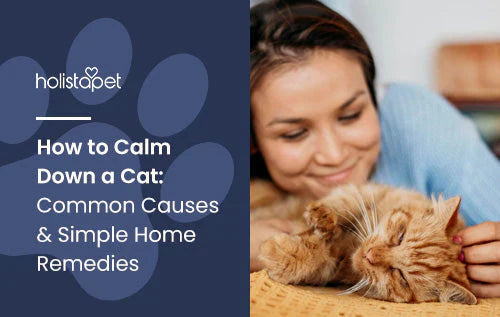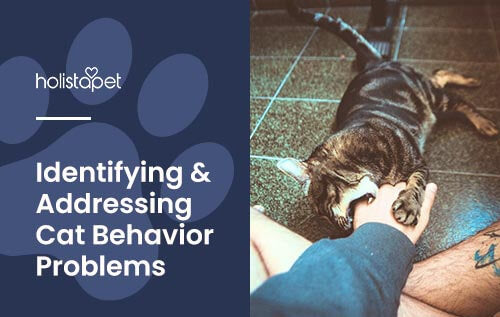Cats have quite a bit of personality and display many emotions. We love it when our cats are friendly and affectionate because it brings us joy. However, when our little feline or furry friend gets in a bad mood, we must know how to calm a cat. Like us, cats can sometimes get in a sour mood. Sometimes, evencats may need a little reminder that things will be okay!
Cats can sometimes feel anxious, stressed, or hyper. But unlike humans, who can find someone else to talk to and help us calm down and communicate through our anxiety episodes, cats need different strategies to help them calm down. We will explore some of the causes of why a cat may feel anxious, stressed, or hyper and what that looks like. We'll also lay out a few strategies to help your cat's anxiety and calm back down and feel better fast!
What Causes Cats to Act Frantically?
Every cat is different and reacts a certain way when introduced to situations in its life. But sometimes, certain conditions can trigger a cat to feel anxious, stressed, scared, or even hyper. Although we would instead our cat feel calm and safe and see our cats in a good mood, recognizing the signs that can bring your cat down is the first step to making them feel better.
Some triggers a cat may experience include being placed in a new environment, meeting new people when taken on car rides, or visiting the vet. When a stressed cat is placed in these situations, its senses may heighten and alter its mood. Here are a few ways to recognize if your cat feels any anxiety or stress or is on the brink of becoming hyper.
Smell
A cat's sense of smell is powerful and far superior to a human's. It is crucial in how cats experience everyday behaviors, including communicating, smelling food, and sexual activity. Cats tend to mark their scent by rubbing their faces on objects like furniture and people. The familiar scent makes the cat feel safe and secure in its environment.
When a cat is placed in a new environment with brand new smells or is introduced to new people or other animals, this can be overwhelming and frightening for your cat.
Sound
A cat's hearing is incredibly sensitive—approximately four times more sensitive than a human's sense of hearing. A cat can hear up to 65kHz, compared to only 20kHz a human can hear. With this incredible hearing, a cat may perceive everyday sounds we think to be expected as loud and alarming.
For example, a cat may feel that we are yelling at them when speaking in a normal talking voice. Cat flaps can also trigger different animals, new people, cars, and other loud city sounds.
Touch
As with hearing, a cat's sense of touch is also compassionate. Cats use their whiskers to feel their surrounding environment and can experience "whisker stress." This occurs when uncomfortable pressure is placed on a cat's whiskers while eating or drinking. Paying attention to a cat's body language when petting it is crucial.
Cats are usually okay with petting on the head and neck but sometimes squirm or go still if touched in other areas. So, as a rule of thumb, it is best always to be gentle when petting your cat and notice any physical signs of uneasiness.
Visuals
Cats also have impeccable eyesight, which allows them to see well in dim lighting and have some color vision. However, they have sensitive sight and rapid movement. Fast movements, such as physical activity, other cats or animals, and laser pointers, can be startling to your cats. Upon witnessing these movements, your cat may respond equally aggressively or hyper. This can make it difficult to calm them down until the quick movements have stopped.
Past Trauma
Past trauma can result from a variety of different sources. Big question how to calm an anxious cat naturally? If your cat is a rescue, they may experience specific triggers related to smells or sounds that may bring traumatic moments. This can be like hearing a car honking outside or drinking from a metal bowl. Another sense of trauma can be taking your cat for a car ride. If the only time you ever take your cat for a car ride is to the veterinarian's office, your cat's anxiety may pick up on these patterns and make it feel anxious every time you take it for a ride.
Cat Zoomies
Cat zoomies are those moments when, one second, your cat is chill, and then the next second, it is flying across the room at full speed. These sudden bursts of energy are common and can result from a poor sleep schedule, a desire to play, or bathroom issues.

Is It Common for a Cat to Be Stressed or Anxious?
Of course, many cats will react. Although every cat has its personality and different triggers that can cause stress or anxiety, it is a relatively common problem. Cats are empathetic creatures and respond positively to uncomfortable situations in several ways. Just as humans can find themselves in stressful or anxious situations when confronted with unfamiliar and new environments, cats can feel the same way.
Unfortunately, cats cannot vocalize their issues the way humans can, so we must rely on other cues from the cat tree to help determine if they are experiencing any stress or anxiety. Identifying potential causes that may trigger stress or anxiety for your cat is essential. Knowing ahead of time if your cat may be meeting new people or visiting your pet parents in a new environment is necessary to be prepared with ways to calm your cat down before these events occur.
Is it Common for a Cat to Be Hyper?
Yes, it is common for cats to have moments of hyperactivity. These extreme bursts of energy can be seen when your cat darts from one end of the house to the next. Typically, it's at full speed or constant meowing! Although it might seem like this behavior comes from out of nowhere at that moment, there are a few possible reasons why your cat might act this way.
Cats and dogs are natural predators so that these sudden hyper moments can result from your cat exhibiting its hunting instincts. Your cat's behavior might demonstrate its predator skills of agility, aggressiveness, and capturing whatever is standing in its way. Another reason cats may become hyper is their nocturnal instinct. Cats are naturally nighttime creatures and might exhibit more energy when the sun goes down.
Fleas and other irritating pesky creatures can be another reason for your cat's hyperactivity. If your cat has developed a flea problem, it might constantly scratch post-meowing or groom itself more than usual.
How to Calm a Cat: Home Remedies for Cat Anxiety
Now that we have listed several reasons your cat may experience anxiety or stress, here are a few strategies and natural remedies to calm cats.
Don't Smother
As much as you want to comfort your kitty or cat when they are experiencing stress or anxiety, it is sometimes best to let them be. Cats have vastly different personalities from humans and may find being overly affectionate more stressful. Depending on how your cat responds to physical affection and comfort, giving it some of its own space while experiencing an episode might be best. This allows them to decompress.
Keep the Cat's Scent
In addition to creating a cozy environment, keeping your cat's scent on furniture, the litter tray or box, the carpet, bedding, and other areas can ensure familiarity and a calm and relaxing space where the cat feels at home.
Use Calming Oils
Calming oils from natural ingredients are another great way to relieve your feline friend's stress. Although cats like to spread their scent around the house, calming essential oils can give off a soothing aroma that is pleasant for cats and you.

CBD Treats
CBD Cat treats can be a perfect way to relax your cat. Cats love eating treats, and CBD treats are an excellent form of relaxation for your cat. Still, these treats can also be beneficial regarding joint issues, reducing pain, and maintaining an overall healthy lifestyle.
Create a Cozy Environment
Creating an environment where your cat can roam freely and express its independence will help reduce stress levels. Providing your pet with a bed, a cat tower, and other areas where your cat can escape has been proven to affect a cat's overall mood positively.
Play Soft Music
As stated earlier, cats have compassionate hearing and respond aggressively to loud noises. So, in the same vein as creating a cozy environment, playing soft music or white background noise in a quiet room can help soothe your nervous cat, too.
Playtime
When a cat is in a certain mood, sometimes it is best to meet it where it is and play with it. Cats are very physically active and often want someone to play with them. So, picking up a laser pointer or a couple of cat toys and finding time to play with your cat will help reduce their stress levels.
Related Post: Tryptophan for Cats: Calming Uses and More
Can I Give My Cat CBD?
Yes! As mentioned, giving cats CBD treats can help with anxiety and reduce stress. CBD is a natural compound found in hemp plants that works with the Endocannabinoid System (ECS) to help maintain balance in the body. And because CBD contains 0% THC, your cat will not feel any psychoactive effects. CBD is a natural component that relieves stress, reduces pain, and promotes a healthy lifestyle.
HolistaPet provides high-quality CBD Calming Chews Made with natural ingredients and no artificial colors, flavors, or preservatives. They also taste great, with a salmon flavor your cat will love.
Related: Cat Food Ingredients [Distinguishing Quality]
Some fantastic CBD oils for Dogs and Cats are also explicitly formulated for pets. Giving your cat CBD oils usually provides quicker results when applied in its mouth or as a drop in its food.
Final Thoughts
Every cat eventually demonstrates signs of stress, anxiety, or hyperactivity. However, many strategies are available to help your cat combat these episodes. Most importantly, creating a peaceful, calm environment and providing a safe space for your cat will tremendously help reduce stress and anxiety. Overall, ensuring your cat feels comfortable and secure is the key to ensuring its health and mood!


 CBD Oil for Cats - Fast Acting
CBD Oil for Cats - Fast Acting
 CBD Cat Treats - Easy Dose
CBD Cat Treats - Easy Dose
 CBD Calming Chews for Cats - Highly Rated
CBD Calming Chews for Cats - Highly Rated
 CBG Oil for Dogs and Cats - Loved by Thousands
CBG Oil for Dogs and Cats - Loved by Thousands





Leave a comment
All comments are moderated before being published.
This site is protected by hCaptcha and the hCaptcha Privacy Policy and Terms of Service apply.